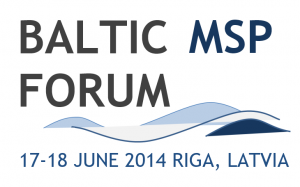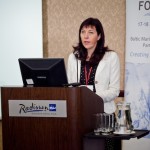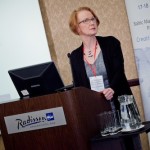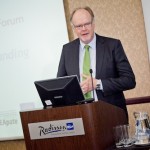 Opening and welcome speeches
Opening and welcome speeches
Moderator: Jan Ekebom, Metsähallitus Natural Heritage Services
Speakers and presentations
- Solvita Zvidriņa, Director of the Lativan State Regional Development Agency
- Ulla Koski, Chairperson of the VASAB Committee on Spatial Planning and Development of the Baltic Sea Region (CSPD/BSR)
- Haitze Siemers, EC DG for Maritime Affairs and Fisheries, Head of Unit for Maritime Policy in the Baltic and North Sea
- Thomas Johansson, Head of the Marine Spatial Planning and Maritime Affairs Division of the Swedish Agency for Marine and Water Management (SwAM)
- Joanna Przedrzymirska, Maritime Institute Gdansk, PartiSEApate project Lead Partner: Transnational Cooperation for MSP - download
Speeches and summaries
Solvita Zvidriņa, Director of the Lativan State Regional Development Agency
 “On behalf of the Latvian Ministry of the Environmental Protection and Regional Development I would like to welcome you all to this Baltic Maritime Spatial Planning Forum. This remarkable Forum brings together experts interested in the well-being of the Baltic Sea as well as those interested in increased prosperity of people living around the sea.
“On behalf of the Latvian Ministry of the Environmental Protection and Regional Development I would like to welcome you all to this Baltic Maritime Spatial Planning Forum. This remarkable Forum brings together experts interested in the well-being of the Baltic Sea as well as those interested in increased prosperity of people living around the sea.
The vulnerable and unique ecosystem of our Sea requires a careful and professional attitude to every maritime-related activity carried out in the Baltics. Maritime spatial planning is not a miracle, but should become a tool for smart governing of human activities within this fragile ecosystem.
We in Latvia understand the seriousness of the environmental and climate change implications. Latvia historically has been a maritime country and many coastal municipalities have large marine-related economies. A few years ago the Latvian government adopted the Spatial Development Strategy of Coastal Territories aiming at sustainable and coherent development of these areas. By implementing Maritime Spatial Planning the linkage between terrestrial and maritime activities should become even stronger. Thus, local ports, fisheries, coastal tourism and other activities will have more clear rules and perspectives.
Latvia has already adopted the necessary legal basis for Maritime Spatial Planning. By using experience of pilot initiatives, Latvian maritime stakeholders are already quite familiar with the tasks and consequences of planning the sea territory. The Ministry has started preparations for launching the official planning process. The discussions of the Forum will certainly facilitate not only pan-Baltic, but also Latvian national maritime planning process.
I wish all participants intense two days of interesting and valuable discussions to ‘create a common understanding’ on maritime planning principles and practicalities as written in the headline of this Forum.”
Ulla Koski, Chairperson of the VASAB Committee on Spatial Planning and Development of the Baltic Sea Region (CSPD/BSR)
 “On behalf of VASAB I would like to thank the organisers of this Forum for an excellent opportunity to exchange our views and experiences on the very topical theme of Maritime Spatial Planning.
“On behalf of VASAB I would like to thank the organisers of this Forum for an excellent opportunity to exchange our views and experiences on the very topical theme of Maritime Spatial Planning.
In the Baltic Sea Region, VASAB’s key role is to represent planning knowledge, expertise and experience. This is why VASAB has been very active in the work on developing Maritime Spatial Planning since its preliminary phases. One could also say that VASAB has been, and still is, one of the key actors in this work in the region.
For planners, it is natural to have a long tradition of land use planning. Such planning is mostly guided by specific legislation and, at the same time, planning systems have been developed step by step over decades. With this background in mind, it is surprising that in maritime areas we haven’t had and don’t yet have any kind of planning system or tradition.
Maritime Spatial Planning and land use planning should not be viewed as separate entities. Land use planning includes many elements which are also very important in the planning of marine areas. From a Finnish perspective I would like to highlight some three aspects:
- First of all, relevant sectors and needs should be analysed and assessed at the same time and during the same planning process.
- Secondly, there should be real opportunities for public participation and free access to all planning information.
- Thirdly, there has to be a democratic decision-making process when taking decisions on the most important choices during the planning process and when approving the final plan.
Developing MSP is a long-term effort by different actors and countries. The Baltic region offers an excellent forum for this kind of cooperation. Over the years, we have had many common processes and projects for collecting and exchanging information and knowledge, and these are still continuing. We also have a long tradition of establishing common principles, and working together on pilot projects and modelling. Moreover, all the countries have a clear political understanding of the importance of developing MSP in the region and engaging in close cooperation.
In other words, we have done a lot, but there is still more to be done during the coming years.
It won’t be long before an MSP directive is in force and all the EU member states will have to implement it. One of the challenges is the need for sufficient uniformity, while leaving room for specific national needs and solutions. Without a doubt, this is important because of the range of planning traditions and systems in the countries of the Baltic region, and thus different approaches to national solutions.
Right now, we are in an extremely interesting phase in the region. All the EU member states will have a lot of work to do when implementing the Directive in the coming two years. Now, more than ever, close cooperation in developing a common planning process is needed.
We have the opportunity now to consolidate our experience and our development work done over the years in different working and expert groups and projects as well as in international organisations.
This forum illustrates how active the MSP cooperation is in the region. During today and tomorrow, we will hear about studies, research, data, projects, cases, policies, and many more interesting topics.
I very much hope that after this forum we will have gained a lot more knowledge of MSP and the motivation to develop it in our own special region during the coming years.
I would like to extend a warm welcome to you all to this forum.”
Haitze Siemers, EC DG for Maritime Affairs and Fisheries, Head of Unit for Maritime Policy in the Baltic and North Sea
 The BSR has always played a crucial role in the development of the EU’s Integrated Maritime Policy. This region has been a frontrunner in terms of sea-basin approach with the European Strategy. Furthermore with BaltSeaPlan a particularly successful MSP project was implemented.
The BSR has always played a crucial role in the development of the EU’s Integrated Maritime Policy. This region has been a frontrunner in terms of sea-basin approach with the European Strategy. Furthermore with BaltSeaPlan a particularly successful MSP project was implemented.
Despite all the progress that has been achieved ever since the IMP was launched, efforts need to be further directed towards the sea. Europe’s future depends on growth and jobs, also in the maritime sector. However, “Blue Growth”, as defined in the corresponding communication of the EU Commission, needs to come as an especially innovative form of economic development. Conditions need to be set for new, innovative sectors, e.g. aquaculture, blue biotechnology, seabed mining, etc. Apart from that also innovative developments within traditional sectors need to be stimulated, e.g. through promotion of LNG fuel and stricter environmental regulations for the shipping sectors. Although economic activities at sea put stress on the marine environment, it needs to be underlined that Blue Growth is a sustainable form of economic development as it respects ecosystem needs.
In the context of Blue Growth, MSP is the tool for a sustainable management of sea uses. The upcoming EU Directive on MSP provides a wider legal framework and will make MSP a reality in the whole EU.
Thomas Johansson, Head of the Marine Spatial Planning and Maritime Affairs Division of the Swedish Agency for Marine and Water Management (SwAM)
 SwAM had only just been created when the agency was invited to join forces with the other partners and launch the PartiSEApate project. Although this was not an easy decision at the time, SwAM is now glad that it agreed as contacts have been developed and knowledge and understanding of MSP has deepened through this project.
SwAM had only just been created when the agency was invited to join forces with the other partners and launch the PartiSEApate project. Although this was not an easy decision at the time, SwAM is now glad that it agreed as contacts have been developed and knowledge and understanding of MSP has deepened through this project.
On the political scene, the Swedish Parliament has just adopted national MSP legislation which will enter into force on 1 September 2014. This legislation, the already existing government regulations as well as the EU MSP Directive set the framework for an MSP implementation. However, important tasks for planners remain. They need to find solutions for actual problems and balance interests.
The Swedish example shows that MSP is a true multi-level endeavour as 85 municipalities, 14 country administrations, 10 regions, 10-15 sectors as well as 8 neighbouring countries are potential stakeholders whose concerns need to be taken into account.
BSR countries should keep up their efforts for joint spatial planning of the Baltic Sea. The EUSBSR offers a valuable framework for a further development of MSP as it already represents the most important sectors.
Joanna Przedrzymirska, Maritime Institute Gdansk, PartiSEApate project Lead Partner
 Powerpoint presentation: Transnational Cooperation for MSP – download
Powerpoint presentation: Transnational Cooperation for MSP – download
In the scope of the PartiSEApate project 11 project partners have spent two years pushing for the development of MSP in the Baltic Sea Region. This project as well as its forerunners BaltCoast, PlanCoast and BaltSeaPlan have made a strong contribution to building up trust among parties responsible for or involved in MSP. They have fostered awareness that differences between countries and cultures exist, but that these differences are not necessarily a barrier for cooperation, if it is understood what is done differently and why. Different perspectives may also have great innovative potential.
Issues raised in the discussion
Although a draft for MSP legislation had been developed four years ago in Sweden, the parliament only passed it very recently. A reason for this delay is that municipalities have been the main responsible bodies for MSP. They were afraid to lose competencies to the benefit of the national government.
Furthermore, the role VASAB has played in the development of MSP was discussed. VASAB has proven very valuable as it fostered cooperation between planners and sectors and increased the learning process in both groups. Without VASAB, planning would possibly be more sector oriented.
Although Finland does not have national MSP legislation yet, the country has a strong planning tradition, including real public participation and a democratic decision-making procedure.
There is a link between MSP and MSFD. In order to accommodate both approaches in a country’s maritime policy the objectives may be formulated in a way that they are related to each other.
The issue of data for MSP is a hotly debated one. There is the need for data gathered with the same intention/purpose. However, the element of trust is also important in this respect. Data from other countries should be used and its compatibility should thereby be tested.

